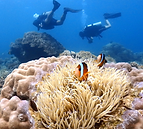
Understand marine debris and its impacts
8 million pieces of plastic pollution find their way into our ocean daily. Marine debris and marine plastics are one of the biggest environmental challenge of our days, responsible for the death of millions of marine organisms every years and threatening our health and well being by finding its way back to us. What is the current situation ? Can can be done about it ? Where to start ? Let's discuss about it all..
This course is perfect for both beginners as well as more advanced conservationists that would like to learn more about environmental conservation challenge and understand what are marine debris, discuss its impacts and what can be done about it.
Standards
-
Learn about the state of marine debris in the ocean, discuss the issue of Plastic and why its disposal is so problematic
-
Understand the impacts of polluted oceans
-
Discuss what are the sources and causes of marine pollution
-
Understand what is currently done to reduce the threat of marine debris and alleviate its impacts
-
Discuss what can be done individually to be part of positive change
Inclusions
-
1 classroom session
-
1 beach clean up
-
1 guided dive clean up (or snorkeling / free diving) to complement classroom session and be able to witness by your own eyes the beauty of coral reef ecosystems and recognize the issue of marine debris (dive and snorkeling equipment is included along with marine fee ) along with a beach clean up
-
Dive and snorkeling equipment is included along with marine fee
-
Vegetarian lunch & snacks included

SCUBA DIVING
(Recommended)

SNORKELING / FREE DIVING
Choose your format
Pre-requirements
Scuba Diving format
-
An open water certification (PADI, SSI, RAID, CMAS, etc.) is required*.
-
and a minimum of 30 dives including at least 1 this year OR a buoyancy training (2 dives) with CRCP done this year*.
Snorkeling format :
-
Ability to swim comfortably (without swimming aid)
-
and Previous experience with a mask, snorkel and fins are required*.
* (You do not fit the requirements? No worries, have a look in the scuba training section, or just contact us for advices.)

Why these requirements?
During the course, you will be learning about small fragile marine organisms and be needing to come very close from them. For your safety (some may sting) and theirs, it is important that you master good buoyancy control and precision of your movements in the water before we do so. This will also make scuba diving much more efficient and enjoyable for you. If you need, we are happy to provide such training ahead of the program.
Timelines & dates
This class is usually a 1 day session from 8 am to 3 pm with classroom session in the morning followed by in water session to complement the theory.
Classes are available any day upon request + confirmed booking.
Start time can vary so double check on the specific date you are interested to book. To insure availabilities, we require you inquire and reserve your slot with a few week's notice.
Class participation fee
The standard fee for this course are listed below and includes all theory, 2 dives, marine fees and dive/snorkeling equipment. It also includes vegetarian lunch and snacks.
-
Class fee while snorkeling : 3,500 PHP
-
Class fee on a scuba diving format : 5,400PHP
-
Class fee with dry activity : 1,500 PHP
Are you Filipino? You may avail an automatic 20% discount on our programs.
Feel free to inquire if you wish to include additional dive training into the course, we are happy to adapt to your personal goals.
By taking this course, you support conservation
LearnwithCRCP is the education platform of CRCP, a fully registered non-stock non-profit NGO in the Philippines, this means that aside from the raw cost of any of our training programs, all remaining balance is used to fund our marine and terrestrial conservation projects. By participating in one of our training program, you are directly supporting environmental conservation. Read more about us and the work that we do by visiting our full website linked below.

